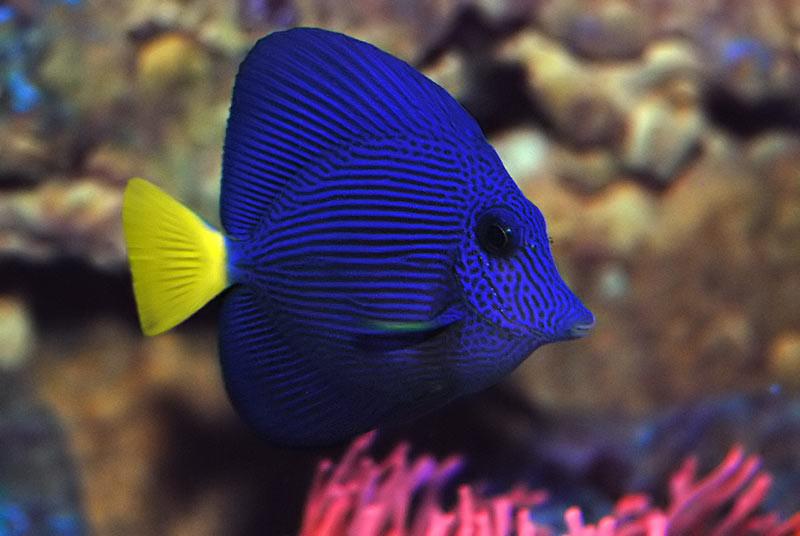

Purple Tang
Behavior:
The Purple Tang is a great choice for aquariums of 120 gallons or more. In larger aquariums of 300 gallons or more, you can keep them in a small school provided they are added at the same time. For some reason, adding an odd numbered group of Purple Tangs usually works better.
When introducing a variety of tangs to an aquarium, it is best to add them in groups to help avoid territorial disputes. Purple Tangs tend to be extra aggressive towards conspecifics with the same body shape such as the Yellow Tang and Scopas Tang. Again, this is where adding them together helps. An established Purple Tang is sure to give a newly introduced Yellow Tang an aggressive welcoming.
Provide all tangs with plenty of open swimming room. In the wild they swim all over the reef grazing on algae.
Purple Tangs will eat a wide range of desirable and undesirable algae. They should not bother corals, clams, or invertebrates. Yellow Tangs are useful in keeping your aquarium looking their best.
Feeding:
The Purple Tang will graze over the live rock in the aquarium eating algae. You can supplement its diet with live macro algae, such as Macro Feast, and dry seaweed 2-3 times per week. Try using a rubber-band to attach the algae to a small rock or pvc pipe and place it in the sand bed.
Rubber-banding algae to bit of tonga branch rock looks the most natural and will stay in place the best.
Soaking all fish food (even algae) with vitamins will help keep your fish healthier and make them less susceptible to disease. We recommend soaking food in garlic as well when adding new fish and whenever your notice ich or other disease in the aquarium. Garlic will help repel external parasites, such as ich, and will boost the fishes immunity.
Feeding Tips:
Remember to feed slowly. Leftover food will cause nitrates and phosphates to rise. If you see food falling to the sand bed and into the rocks, you should feed slower and give the fish a chance to eat before adding a little more. Using a turkey baster allows you to target food to different fish. For example you can feed the aggressive fish on one side of the tank and then squirt a little bit on the other side for the less aggressive fish. This way all the fish get a chance to eat enough.
Maximum Length:
10"Care Level:
ModerateFamily:
AcanthuridaeReef Compatibility:
GoodMinimum Aquarium Size:
120 gal.Origin:
Red SeaDiet:
HerbivoreWater Conditions:
75-80° F; sg 1.024-1.026 (1.025 is ideal); pH 8.1-8.4 Ca 420-440 ppm, Alk 8-9.5 dKH, Mg 1260-1350, Nitrates <10ppm, Phosphates, < .10ppm
Water Chemistry:
Maintaining Ammonia at 0 ppm, Nitrites at 0 ppm, and Nitrates below 10ppm will help to keep your Purple Tang happy and healthy. We recommend doing a water change soon after Nitrates rise above 10 ppm. Maintaining proper calcium (420-440 ppm), alkalinity (8-9.5 dkh – run it 7-8 if you are carbon dosing), and magnesium levels (1260-1350 ppm) will help to keep pH stable in the 8.1-8.4 range. We recommend a specific gravity of 1.024-1.026 with 1.025 being ideal for fish. Temperature should remain stable as well and should stay within a 2 degree range.